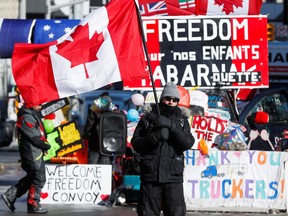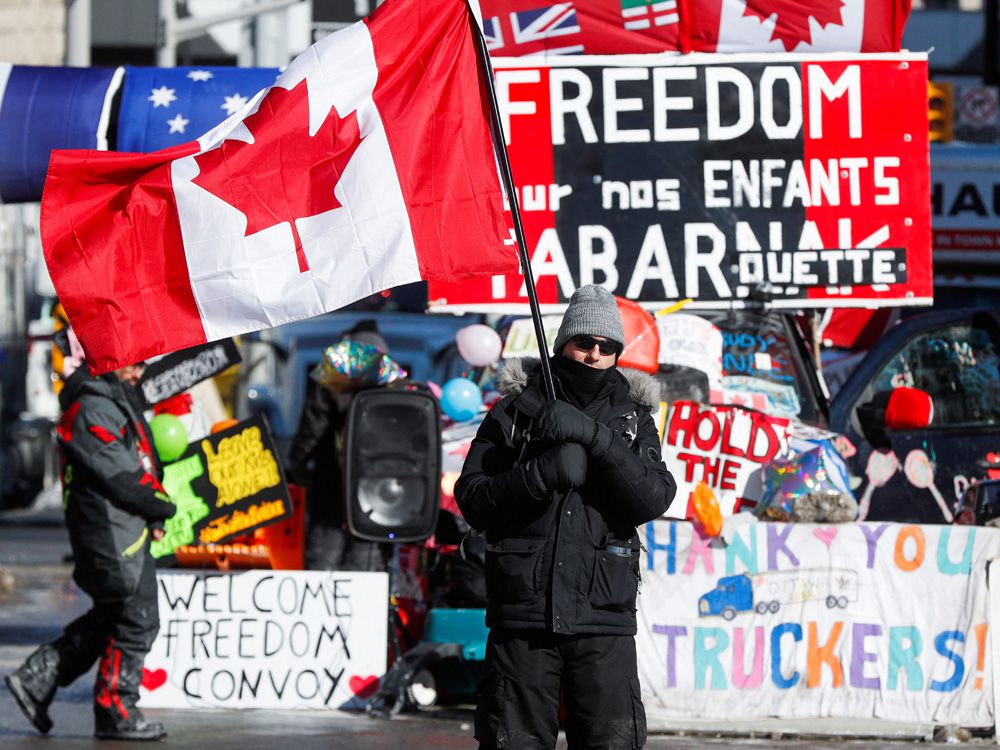‘The blockades are harming our economy and endangering public safety’

Article content
Trade between Canada and the United States was poised to return to normal after Prime Minister Justin Trudeau invoked the Emergencies Act, giving local authorities greater tools to keep stubborn supporters of the “Freedom Convoy” from blocking border crossings.
Advertisement
This advertisement has not loaded yet, but your article continues below.
Article content
Trudeau consulted with provincial premiers Monday morning after assembling his cabinet for a rare Sunday night meeting. The measures will be debated in Parliament this week but were to take effect immediately as per the provisions of the legislation.
“The blockades are harming our economy and endangering public safety,” Trudeau said at a press conference in Ottawa.
Last week, protesters inspired by the Freedom Convoy’s siege of Ottawa set up blockades at various border crossings, including the Ambassador Bridge, a vital supply route that connects automobile factories in Michigan and Ontario. Police in Windsor dispersed the protesters at the bridge on Sunday, arresting dozens of people and seizing vehicles.
Advertisement
This advertisement has not loaded yet, but your article continues below.
Article content
The week-long blockade disrupted trade and forced several car plants reliant on integrated supply chains between Canada and the U.S. to shut down production. Deputy Prime Minister Chrystia Freeland said the blockades in Windsor disrupted $390 million in trade each day, while in Coutts, Alta. and Emerson, Man., $48 million and $73 million, respectively, have been affected on a daily basis.
Freeland announced a series of emergency measures to halt any funding flowing in to assist protesters and blockades. Banks will be given the authority to review accounts of those they suspect to be part of the blockades and freeze their money. Crowdfunding platforms and cryptocurrency platforms will now have to report any suspicious or large transactions to authorities, as banks currently have to.
Advertisement
This advertisement has not loaded yet, but your article continues below.
Article content
“International confidence towards Canada as a good place to invest and do business has been shaken,” Freeland said. “The world is watching us. Our jobs, our prosperity and our livelihoods are in danger. That is why our government is acting.”
The minister wasn’t exaggerating, said Carlo Dade, director of trade and investment at the Canada West Foundation, a think-tank. Dade said he’s been tracking international media stories on the protests, and coverage keeps expanding. “We’re seeing 20 to 40 hits a day. Today, we’re getting up to 60 to 70,” Dade said. “This is Indonesia, Vietnam, India, Malaysia, Japan, Korea. So, the markets that are the target of the government’s (trade) growth and diversification strategy, I would argue, are taking note.”
Advertisement
This advertisement has not loaded yet, but your article continues below.
Article content
Ottawa has a lot of work to do to restore Canada’s credibility as a reliable supplier of goods, especially considering the protectionist sentiment in the U.S., said the head of Canadian Manufacturers & Exporters. “The U.S. reacts to many things but anything that relates to its business, it reacts quickly,” Dennis Darby said in an interview.
Truck drivers upset over a federal order that required proof of vaccination to return to Canada at land borders and other civilians set up a blockade of Ottawa at the end of January. Thousands would descend on the capital, blocking streets, blaring their horns and disrupting civilian mobility. In a matter of weeks, the demonstrations spread to other places in Canada and around the world.
Advertisement
This advertisement has not loaded yet, but your article continues below.
Article content

Invoking the Emergencies Act gives the federal government short-lived powers to limit civilian travel, use or dispose of property, manage the provision of essential services such as policing to fine or imprison people, according to a memo on the federal website. It does not mean that the prime minister will deploy the military to shut down the protests, an extreme response that he’s described as a “last resort.”
It’s the first time the Emergencies Act has been invoked. In 1988, it replaced the War Measures Act, which Pierre Trudeau, the prime minister’s father, used in 1970 during the October Crisis.
By way of example, Trudeau said finding willing tow-truck operators to remove the rigs that are barricading the crossings in Coutts and Emerson has slowed the response; now, local authorities can compel any towing company with a government contract to help clear away the vehicles that are clogging the border, the prime minister said.
Advertisement
This advertisement has not loaded yet, but your article continues below.
Article content
“You have a right to express that frustration and even your anger with the government or government policies,” Trudeau said. “It’s something we’ll always defend in this free and democratic country. But blockading the streets and critical infrastructure and depriving your neighbours of their freedoms is a totally different thing. It has to stop.”
The Ontario government declared a state of emergency on Friday, which empowered police to clear the Ambassador Bridge over the weekend. Premier Doug Ford followed that stick with a carrot on Monday, announcing that he would advance his timeline for easing COVID-19 restrictions. Ford said he would end vaccine passport protocols and scrap indoor capacity limits.
Advertisement
This advertisement has not loaded yet, but your article continues below.
Article content
-

How the Ambassador Bridge blockade hit Canada’s economy — and our reputation
-

Ambassador Bridge standoff is over, but deep divisions remain
-

Ontario announces end to vaccine passports, other COVID-19 restrictions by March 1
“Lifting COVID-19-related business restrictions sooner than initially planned is positive news for Ontario business and economic recovery,” Rocco Rossi, president of the Ontario Chamber of Commerce, said in a statement. “Meanwhile, vulnerabilities such as inflation, labour shortages and supply chain disruptions, have been exacerbated by the global state of emergency.”
In Coutts, protesters and truckers have blocked a key goods crossing into Montana since the end of January. On Monday, RCMP arrested 11 people and seized their weapons. The RCMP recovered 13 long guns, hand guns, body armour, a machete, ammunition and high capacity magazines.
Advertisement
This advertisement has not loaded yet, but your article continues below.
Article content
The blockades will add strain to Canada’s economy and could fuel growing American protectionist sentiment. In the short-term, blockages at the border are going to put pressure on consumer prices and slow economic growth, said Royce Mendes, director of macro strategy at Desjardins.
Before the protests, the Bank of Canada had forecast two per cent GDP growth, annualized, in the first quarter after the economy posted sizeable gains late last year. Many economists, including Mendes, now expect first-quarter GDP growth to be flat and inflation to surge as a result of shortages caused by the blockades.
“I don’t want to exaggerate the likely impact of all of this for either growth or inflation, but it is a step in the wrong direction on both of those fronts, rather than the hopeful steps in the right direction that we were expecting to see after the Omicron wave,” Mendes said in an interview.
• Email: bbharti@postmedia.com | Twitter: biancabharti
Advertisement
This advertisement has not loaded yet, but your article continues below.


